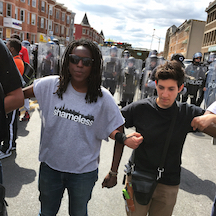The University of Baltimore and the University of Maryland, Baltimore County are teaming up with the Maryland Historical Society to create an archive to document the history of the Baltimore protests surrounding the death of Freddie Gray in April resulting from injuries sustained while he was in police custody.

To date more than 1,200 items have been donated to the archive including photographs, videos, and eyewitness oral histories. A website has been set up by Denise Meringolo, an associate professor of history at the University of Maryland, Baltimore County to display the historical archive.
The goal of the effort as stated on the website is “to gather and preserve as many perspectives and experiences of protest and unrest as possible. Too often, history is shaped by official accounts. When the history of the Baltimore Uprising of 2015 is written, we want to make sure it can include voices from the streets as well as voices from the halls of government.”


Great project. There may be, however, collateral news coverage to the Baltimore events deserving of inclusion in the study. I call it the “survival index” of news stories relating to
the factors contributing very specifically, even underlying, the Baltimore Protests. The Washington Post published a report on the treatment of mentally ill people in Baltimore prisons in the time frame of coverage of the protest. The impact of the treatment of mentally ill prisoners affects the survivability of families. A “survival index” could be created by nationally monitoring news stories affecting these family survivors. It could encourage more of such stories to make what is all too well known to the “survivors,” but not reported often enough for the electorate to recognize these as major issues to be dealt with by a democracy. The press must be encouraged to address these issues with regularity so that they become the basis for voters to be guided by them. (Are you including coverage of Black newspapers?) Their stories should be included to show the disparity in coverage of these issues just to show how the general press is failing our democracy. A study of the words used is also warranted. I was startled by the report recently that labeled what “polite” publications have always called plantation life whereas they should actually be called armed prison camps. Such choice of words makes arguing over flags seem very superficial. Thanks for listening. PGZ